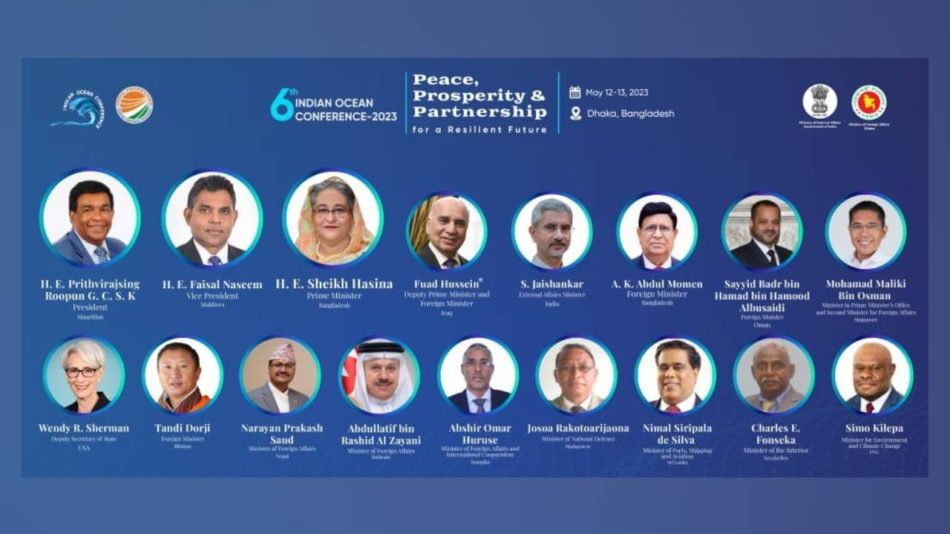This year, Dhaka is hosting the 6th Indian Ocean Conference (IOC). The flagship conference is taking place on May 12and 13 in several venues in Dhaka. Heads of states, ministers, and delegations from 25 countries and several organizations will attend the two-day conference this year.
Amid the heated geopolitical situation in the Indo-Pacific region, this conference will bring the Indian Ocean countries and their partners together to bolster regional cooperation on common issues. Against this backdrop, there is a greater significance and several expectations from this platform’s sixth gathering.
What is the Indian Ocean Conference?
The IOC was first started back in 2016. In the inaugural conference, 30 states joined and discussed common issues. The conference began as India took the initiative under its Security And Growth for All in the Region (SAGAR) policy. Over the last seven years, five conferences have taken place in different cities. Gradually the conference emerged as a flagship consultative forum for Indian Ocean Countries and their respective partners, such as the United States of America (USA). Broadly, delegates discuss common security issues and possible paths toward prosperity during the conference.
The Dhaka chapter of the Indian Ocean Conference
The sixth episode of the IOC this year is taking place in Dhaka, with Bangladesh as the host. This year the conference is bringing “Peace, Prosperity, and Partnership for a Resilient Future” as its central theme. Bangladesh’s Prime Minister, Sheikh Hasina, will inaugurate the program. One hundred and fifty top-level delegates from 25 countries will attend on May 12 and 13.
Interestingly, Myanmar is not invited to this year’s conference. Perhaps, it is because of the legitimacy crisis of Myanmar’s Junta government in the international arena. Apart from the state parties, delegations from regional organizations such as D-8, SAARC, and BIMSTEC will also attend. This year’s top delegates include President Roppun of Mauritius, Vice President of Maldives Faisal Naseem, Indian External Affairs Minister S. Jaishankar, US Deputy Secretary of State Wendy Sherman, and many others.
Several personas from strategic thinking, the media, and academia will also attend and speak at the conference. The thematic sessions will cover topics such as ‘Roadmap for an economically sustainable future in the Indo-Pacific,’ ‘Forging partnerships in the Indo-Pacific for peace and prosperity,’ ‘Rise of a peaceful Indo-Pacific for a resilient global future,’ and ‘Dealing with non-traditional security challenges for a peaceful and sustainable Indo-Pacific.’ Besides thematic sessions, there will be several plenary sessions in which the attendees will discuss broader regional issues and share country experiences.
Importance and Expectations
Over the past few years, the Indo-Pacific region has become a theater for great power rivalries. Amid these heated geopolitics, a platform of such a kind will allow the regional states to discuss common issues. The participation of a wide range of countries ranging from regional powers to littorals, great, middle, and small powers will provide a diversified perspective that would benefit understanding each other’s priorities.
During the plenary sessions, countries are expected to have the chance to discuss their own perspectives regarding several common causes, such as maritime security, expanding the blue economy, combatting piracy, and illegal fishing. Moreover, as the world is going through an economic crisis after the pandemic and Ukraine war, they would likely discuss emergent issues affecting the regions. The plenary sessions and keynote speeches should also explore the options for mitigating the crises.
The themes of formal sessions yield expectations that countries will get to consult multilaterally regarding economic concerns, regional security dilemmas, and several non-traditional security concerns such as refugee crisis, forced migration, terrorism, piracy, climate change, Local Currency trade, energy crisis, and regional partnership- that are timely and required for the region’s prosperous future.
As Indian Ocean countries are finding themselves amid heated geopolitics, gradually, it has become more challenging for them to find space for consultative multilateral and multi-track dialogue. Quite often, most littoral and small powers find their national interest being overshadowed or ignored by the great power interests. Interestingly, most countries want to refrain from engaging militarily or joining any blocs owing to their complex interdependence with almost all great powers.
Instead, they opt for remaining neutral and prefer to sit on the fence while the great power wrestles. As the space is shrinking and polarization is increasing, such a forum provides a “breathing space” for these states. Moreover, beyond great power rivalry, the forum will foster regional cooperation that most Indian Ocean countries cherish for a better future and prosperity and to fulfill their national interest. Therefore, expectations will be high, and it is expected from the delegates that they will successfully identify common issues and tentative scope of cooperation to address those.
*Shafiqul Elahi is a retired government official of Bangladesh.
May 12, 2023
The viewpoints expressed by the authors do not necessarily reflect the opinions, viewpoints and editorial policies of Aequitas Review.


